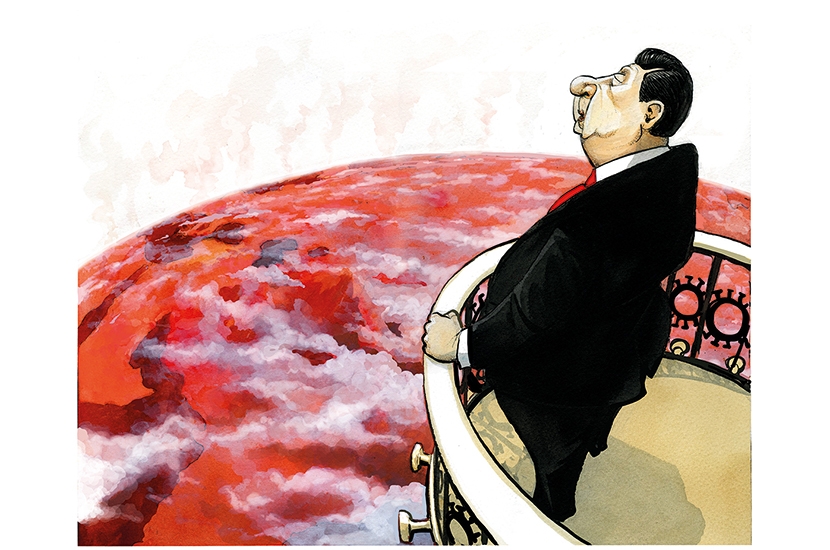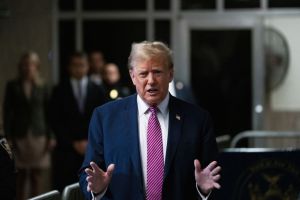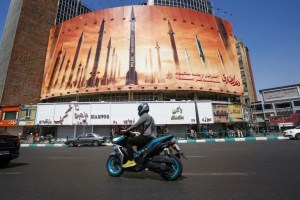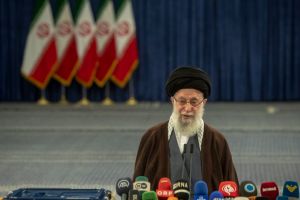Last night, the BBC showed witnesses giving stomach-turning testimony about organized rape and torture inflicted upon Uighurs in China’s far west region of Xinjiang. Victims and former guards, now abroad and willing to talk, spoke of electric batons inserted into women’s genitalia, gang rape by police, an organized rape in front of 100 other women forced to watch with those who looked away punished, and the forcible sterilization of a 20-year-old. As one witness said: ‘Everyone who leaves the camps is finished.’
In January, both the outgoing and incoming American secretaries of state confirmed their view that the Chinese Communist party’s treatment of Uighurs constituted genocide. Not some analogous ‘cultural genocide’. Genocide.
Perhaps we should just settle for ‘mass atrocities’, as did Ephraim Mirvis, the UK’s Chief Rabbi. Or ‘crimes against humanity’. For what is happening in Xinjiang certainly meets the description in the International Criminal Court’s definition of crimes against humanity, acts ‘when committed as part of a widespread or systematic attack directed against any civilian population, with knowledge of the attack’. It lists enslavement (e.g. slave labor), deportation, imprisonment in violation of fundamental rules of international law, torture, rape, enforced sterilization, persecution of any identifiable group, serious injury to physical or mental health, and more. All are ongoing in Xinjiang.
The word ‘genocide’ conjures up the Holocaust, planned murder, massacre and extermination. Has the CCP held its version of the Wannsee Conference? No, or rather, sort of. But certainly, there is no evidence of a campaign to kill. There have been a few deaths (we don’t know how many). This is inevitable, if you lock up perhaps 1.5 million people in concentration camps. But it is not a holocaust.
Yet genocide does not have to be synonymous with gas chambers. As Xi Jinping, quoting an earlier Chinese thinker, said in another context: ‘To destroy a people, you must first destroy its history.’ And to prevent its resuscitation, he might have added that you must strangle language, education, culture and the ability to reproduce. For those, the CCP has built an ever more detailed system of surveillance and repression.
Under Article 2 of the UN Convention on genocide, killing members of a ‘national, ethnical, racial or religious group’ is only one of five reasons for actions to qualify as genocide. The other four are: causing serious bodily or mental harm to members of the group; deliberately inflicting conditions of life calculated to bring about a group’s destruction in whole or in part; preventing births; and forcibly transferring children to another group.
Genocide also requires that the actions have the ‘intent to destroy’. The CCP does not spell out its intent, although it comes close when Xi insists on the ‘Sinicization’ of religion or advances his vision of a new ‘Zhonghua minzu’ (usually translated as ‘Chinese nation’, but ‘Chinese race’ is closer). Nevertheless, the scale of the atrocities, the clear and detailed planning, the allocation of resources, and the very detailed methodologies of repression, all revealed in leaked documents, are surely sufficient to convince, if not convict.
Who deserves conviction? The US has imposed ‘Magnitsky sanctions’ on Xinjiang party secretary, Chen Quanguo. But the buck does not stop there. Chen may be the innovator and implementer of genocide, but the policy belongs higher up. It is quite impossible in the CCP system that a policy of this importance was not decided at the highest level, in the seven-man Politburo Standing Committee. That means that ultimately Xi is responsible.
If you want evidence of a Wannsee Conference ‘with Chinese characteristics’, to use a description beloved of the party, look at last September’s Central Xinjiang Work Conference. All seven members of the Politburo Standing Committee attended and 19 of 25 Politburo members. You don’t get this level of attendance if it is not for a policy commissioned, considered and authorized by the top — the very top.
If you want more evidence, here is the Party School in Xinjiang — the purpose of Party Schools is to educate party members in party policy:
‘Beginning on December 19, 2013, Xi Jinping has put forward clear requirements for the work in Xinjiang under the new situation and has drawn up a major strategic plan. From April 27 to 30, 2014, he engaged in a high-level inspection of Xinjiang and made plans for its future from a strategic and comprehensive perspective…We must severely crack down on ethnic separatist activities and persist in the anti-separatism struggle with both cultural and military forces.’
A ‘severe crackdown’ might be one of the most unpleasant euphemisms of the century. Xi may not concern himself with the detail of how policy is implemented, but that hardly excuses him. He must know how his security forces act elsewhere in China. Moreover, if nothing else, the leadership will be well aware of accusations which have been made in foreign countries. Why? Because the party has gone to great propaganda lengths to counter discoveries made by journalists and scholars, issuing ‘White Papers’ and holding big press conferences.
No, it is Xi’s policy. He knows what is happening. He is responsible. Whether he will ever be held accountable is another matter.
The like-minded democracies (a better term than ‘the West’, because this is not another Cold War given China’s economic heft, our interwoven economies and our need to work together on global challenges such as climate change) have not faced this situation before. With Nazi Germany or the Rwandan genocide it meant war or imposing measures on a small country. Is anyone going to sanction Xi?
In a word beloved of bureaucrats, we have to be more ‘nuanced’ than that. Certainly, we should sanction as high as the 25-person Politburo, even if the Standing Committee may escape.
We need to call out China loudly. We need to use the skills developed by the likes of Bellingcat to shine a light upon Chinese companies benefiting from the genocide, and we need to stop our companies dealing with them (according to a report by the Australian Strategic Policy Institute, ‘Huawei’s work in Xinjiang is extensive and includes working directly with the Chinese Government’s public security bureaus in the region’). And in Britain, we need to dissuade our leaders from taking Xi to a pub for a pint and some fish and chips. David Cameron’s ‘Golden Era’ has proved to be a golden error.
This article was originally published on The Spectator’s UK website.


















